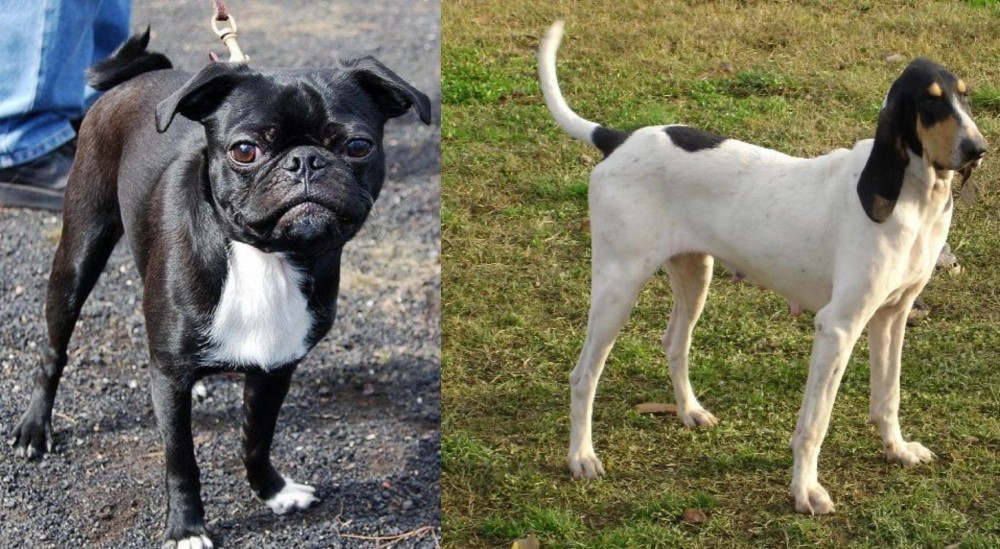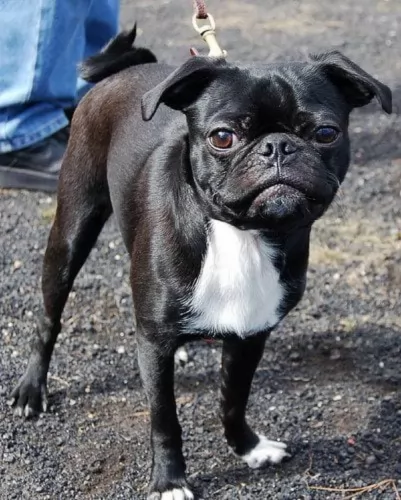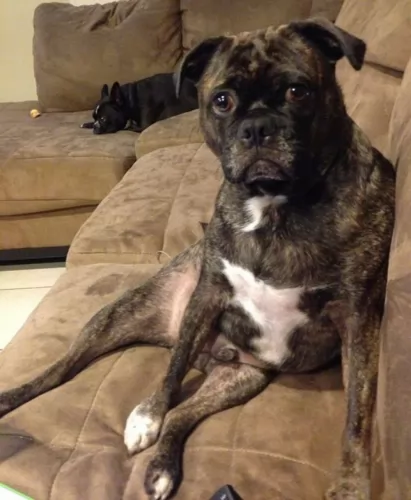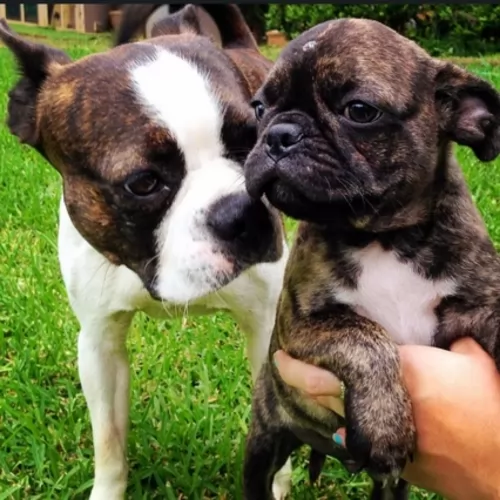 Petzlover
Petzlover Bugg is originated from United States but Petit Gascon Saintongeois is originated from France. Bugg may grow 24 cm / 9 inches shorter than Petit Gascon Saintongeois. Bugg may weigh 16 kg / 35 pounds lesser than Petit Gascon Saintongeois. Both Bugg and Petit Gascon Saintongeois has almost same life span. Both Bugg and Petit Gascon Saintongeois has same litter size. Bugg requires Moderate Maintenance. But Petit Gascon Saintongeois requires Low Maintenance
Bugg is originated from United States but Petit Gascon Saintongeois is originated from France. Bugg may grow 24 cm / 9 inches shorter than Petit Gascon Saintongeois. Bugg may weigh 16 kg / 35 pounds lesser than Petit Gascon Saintongeois. Both Bugg and Petit Gascon Saintongeois has almost same life span. Both Bugg and Petit Gascon Saintongeois has same litter size. Bugg requires Moderate Maintenance. But Petit Gascon Saintongeois requires Low Maintenance
 The Bugg is generally a cross between a Boston Terrier and a Pug. There is no clear history in terms of who started this hybrid dog that was recognized initially be the IDCR or International Designer Canine Registry in 2009. This very cute little dog has become increasingly popular in a very short period of time. Crossing these two breeds created a small dog that loves to sit in your lap as well a romp and play.
The Bugg is generally a cross between a Boston Terrier and a Pug. There is no clear history in terms of who started this hybrid dog that was recognized initially be the IDCR or International Designer Canine Registry in 2009. This very cute little dog has become increasingly popular in a very short period of time. Crossing these two breeds created a small dog that loves to sit in your lap as well a romp and play.
At this time the Bugg is recognized by several of the hybrid and designer registries and clubs. This would include in addition to the IDCR:
 The Petit Gascon Saintongeois comes from- and is in fact a smaller version of the Grand Gascon Saintongeois. The dog has been used for hunting. Hunters wanted a smaller dog and these were the Petit Gascon Saintongeois.
The Petit Gascon Saintongeois comes from- and is in fact a smaller version of the Grand Gascon Saintongeois. The dog has been used for hunting. Hunters wanted a smaller dog and these were the Petit Gascon Saintongeois.
There was a time when the numbers of these dogs became less and their numbers were restored by Baron Virelade in the 19th century. It is where this dog gets his nickname from.
The Petit Gascon-Saintongeois was recognized by the United Kennel Club on January 1, 1993.
 This cross between the Boston Terrier and Pug can have several different looks depending upon whether the individual dog resembles the Pug or the Boston more. Some usual but not always physical characteristics include curly tails, droopy ears and a stocky body in a small dog. They usually have soft, straight coats. Most Buggs look more like the Boston than the Pug although they have the more smashed muzzles and shorter legs of the Pug. The heads are round with almond shaped eyes.
This cross between the Boston Terrier and Pug can have several different looks depending upon whether the individual dog resembles the Pug or the Boston more. Some usual but not always physical characteristics include curly tails, droopy ears and a stocky body in a small dog. They usually have soft, straight coats. Most Buggs look more like the Boston than the Pug although they have the more smashed muzzles and shorter legs of the Pug. The heads are round with almond shaped eyes.
 The Petit Gascon Saintongeois is a smaller version of the Grand Gascon Saintongeois but he is still muscled and lean and looked upon as being a large, robust dog.
The Petit Gascon Saintongeois is a smaller version of the Grand Gascon Saintongeois but he is still muscled and lean and looked upon as being a large, robust dog.
His coat is short and dense and is white with black patches and some speckles. You'll find that there are nearly always black patches found on either side of the head, surrounding the eyes and covering the ears. The ears are essentially black, although there is also some tan coloring.
The ears are floppy, the tail long and saber-shaped.The Petit Gascon Saintongeois is a well proportioned dog standing at between 56 to 62cm in height and weighing 23 to 27kg.
The Petit Gascon Saintongeois is a friendly, good-natured pet, being loyal and loving with his human family and being a good playmate to children. He is also intelligent and amicable and will be easily trained and socialized.
 This crossbreed is easily trainable and highly intelligent. They might be stubborn like the Boston or devoted like the Pug. They can have characteristics of both parents and be loving, playful lapdogs. They love to play with children, but they can be territorial like the Boston. The Bugg is a small dog with a big attitude. They are affectionate and sweet, friendly towards people and other animals. Since the Boston and the Pug have very similar characteristics and temperament, you can have a pretty good idea what your Bugg will be like.
This crossbreed is easily trainable and highly intelligent. They might be stubborn like the Boston or devoted like the Pug. They can have characteristics of both parents and be loving, playful lapdogs. They love to play with children, but they can be territorial like the Boston. The Bugg is a small dog with a big attitude. They are affectionate and sweet, friendly towards people and other animals. Since the Boston and the Pug have very similar characteristics and temperament, you can have a pretty good idea what your Bugg will be like.
 Your gentle, calm, amicable Petit Gascon-Saintongeois is such an excellent hunting dog, but he doesn’t let that get in the way of him being a wonderful family pet as well.
Your gentle, calm, amicable Petit Gascon-Saintongeois is such an excellent hunting dog, but he doesn’t let that get in the way of him being a wonderful family pet as well.
His friendly, good natured, docile temperament makes this particular breed a superb choice as he gets on so well with children too if they themselves have been taught to be kind to animals and to respect them.
He is intelligent too and easy to train, and he is attractive to look at as a bonus. This all makes him the kind of pet and companion that everyone could benefit from.
 The Petit Gascon-Saintongeois has no documented breed related health problems. As previously mentioned, with his long ears, check out the inside of his ears regularly for ear infections.
The Petit Gascon-Saintongeois has no documented breed related health problems. As previously mentioned, with his long ears, check out the inside of his ears regularly for ear infections.
Ticks fleas and worms are a curse. Worms particularly are terrible internal parasites and in fact some worms can even be fatal in puppies. Some of the signs your dogs may have worms include weight loss, a dull, dry, thinning coat, no loger interested in food, diarrhea and vomiting. The best way to respond to your pet’s worm issues is to get him to the vet.
This problem is looked upon as a medical emergency. Gastric dilatation and volvulus, if left, can kill your dog. It’s when gas is trapped in the stomach which has twisted, blocking off the stomach’s blood supply.
Deep chested dogs, feeding your dog just one meal a day so that he gobbles it up too quickly, and older, obese dogs are more prone to bloat. Your dog will require immediate veterinary intervention.
 Buggs love to eat and will anything you give them and some things that you don’t. They can become obese very easily so watch their food intake. These small dogs should be eating food made for small dogs. Feed them only ¾ to 1 and ½ cups of dry food per day split into two meals.
Buggs love to eat and will anything you give them and some things that you don’t. They can become obese very easily so watch their food intake. These small dogs should be eating food made for small dogs. Feed them only ¾ to 1 and ½ cups of dry food per day split into two meals.
The Bugg can inherit health problems from either the Boston or the Pug, or they may be healthier than either parent breed. Both of these parent breeds are given to Brachycephalic issues due to their mashed faces. They could face respiratory issues or eye issues because of this.
The Bugg is a very energetic and playful dog. They love to run, play and go on walks. Just one walk or play session per day is enough exercise for this little dog. You can easily have your play time inside if you don’t have a fenced yard. Because of their faces and breathing issues do not let them get overheated.
 The Gascon Saintongeois is looked upon as being a fairly low maintenance breed. That is because the coat is short and smooth, although the coat does become thicker in the Winter time. He sheds so you will want to brush his coat at least twice a week.
The Gascon Saintongeois is looked upon as being a fairly low maintenance breed. That is because the coat is short and smooth, although the coat does become thicker in the Winter time. He sheds so you will want to brush his coat at least twice a week.
With his long floppy ears, during your brushing session, check inside his ears as dampness, wax and debris can become the ideal breeding spot for bacteria, and ear infections can be the result. Check for redness and possible discharge.
Check his eyes that they are clear and bright.
While brushing him, check for any new, unusual lumps.
Keep his nails well trimmed.
Provide him with a nice warm, dry spot to sleep.
When he’s oudoors, make sure that he has both sun and shade and that his waterbowl is always available.
Make sure that at the first signs of illness you get your pet to the vet.
Feed him only the best quality kibble there is. Occasionally give him some home-made food. Keep this food simple and nutritious. You can’t go wrong with boiled chicken, brown rice or pasta, sweet potatoes, carrots and spinach. You can chop this up and add it to his kibble. Sometimes it can benefit your pet to include some raw meat as well.
If only pet owners would realize that their pets don’t want all those spicy, exotic people foods. They just give a dog a stomach ache and eventually shorten his life. Make sure he always has access to a bowl of cool, fresh water.